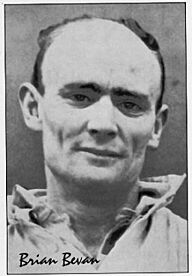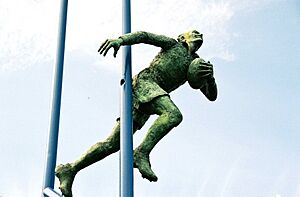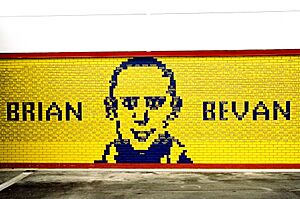Brian Bevan facts for kids
 |
||||||||||||||||||||||||||||||||||||||||||||||||||||||||||||||||||||||||||||||
|
Personal information
|
||||||||||||||||||||||||||||||||||||||||||||||||||||||||||||||||||||||||||||||
|---|---|---|---|---|---|---|---|---|---|---|---|---|---|---|---|---|---|---|---|---|---|---|---|---|---|---|---|---|---|---|---|---|---|---|---|---|---|---|---|---|---|---|---|---|---|---|---|---|---|---|---|---|---|---|---|---|---|---|---|---|---|---|---|---|---|---|---|---|---|---|---|---|---|---|---|---|---|---|
| Full name | Brian Eyrl Bevan | |||||||||||||||||||||||||||||||||||||||||||||||||||||||||||||||||||||||||||||
| Born | 24 June 1924 Sydney, New South Wales, Australia |
|||||||||||||||||||||||||||||||||||||||||||||||||||||||||||||||||||||||||||||
| Died | 3 June 1991 (aged 67) Southport, England, United Kingdom |
|||||||||||||||||||||||||||||||||||||||||||||||||||||||||||||||||||||||||||||
|
Playing information
|
||||||||||||||||||||||||||||||||||||||||||||||||||||||||||||||||||||||||||||||
| Position | Wing | |||||||||||||||||||||||||||||||||||||||||||||||||||||||||||||||||||||||||||||
|
||||||||||||||||||||||||||||||||||||||||||||||||||||||||||||||||||||||||||||||
|
As of 2 March 2022
|
||||||||||||||||||||||||||||||||||||||||||||||||||||||||||||||||||||||||||||||
Brian Eyrl Bevan (born June 24, 1924 – died June 3, 1991) was an amazing Australian rugby league player. People called him the "Wing Wizard" because he was so fast and skilled. He played in the 1940s, 1950s, and 1960s. Brian Bevan is the only player to be in both the Australian Rugby League Hall of Fame and British Rugby League Hall of Fame.
He scored a world record 796 tries, mostly for the Warrington team in England. In 2008, he was chosen for Australia's Team of the Century. This was special because he was the only player on that team who never played for Australia in a test match.
Contents
Early Life and Rugby Beginnings
Brian Eyrl Bevan was born in Sydney, Australia, on January 24, 1924. His father, Rick Bevan, was also a rugby league player for Eastern Suburbs. Brian started his own career with Eastern Suburbs in 1942.
During World War II, he joined the Royal Australian Navy. This meant he could not play many games for his club. Even though he never scored a try for Eastern Suburbs, he would later break many try-scoring records in England. Brian's brother, Owen 'Ozzy' Bevan, also played rugby for the St George Dragons and Warrington.
Becoming a Star in Britain
Arriving in England
In 1946, Brian Bevan arrived in Britain on a ship. All he had was a letter from a former player, Bill Shankland, recommending him. Shankland suggested he try out for the Leeds team. However, Leeds did not sign him because he looked a bit small.
He then tried Hunslet, but they also turned him down. Finally, he went to the Warrington club. Warrington gave him a trial game in November, and he scored a try! They were impressed and signed him for £300. He went back to Australia to finish his Navy service, then returned to Warrington.
Breaking Records in the 1940s
In his first season (1946–47), Bevan scored 48 tries for Warrington. This was 14 more tries than any other player in the league! He was the top try scorer in Britain five times during his career.
He also helped Warrington win the Championship final in the 1947–48 season. In 1948, he scored a try in the 1948–49 Lancashire Cup Final, though Warrington lost to Wigan.
Dominating the 1950s
Brian Bevan played a key role when Warrington beat Widnes 19–0 in the 1949–50 Challenge Cup Final in 1950. This big game was played at Wembley Stadium in London, with nearly 95,000 fans watching. Within just four years at Warrington, Bevan had already broken the club's try-scoring record.
He was the top try scorer again in the 1950–51 season. In 1952, he played for the British Empire XIII against New Zealand.
His best season for scoring tries was 1952–53, when he scored 72 tries! Only Albert Rosenfeld has scored more tries in a single season in Britain. In 1954, Bevan became the highest try scorer in rugby league history. He passed the record of 446 tries set by Alf Ellaby.
Bevan also helped Warrington win the Championship in the 1954–55 season. In 1959, he scored a try in the 1959–60 Lancashire Cup Final, where Warrington beat St. Helens.
Final Years and Legacy
In 1961, Bevan visited Australia to play in a special seven-a-side game. His last game for Warrington was in 1962. During his time with the club, he scored three or more tries in a single game 100 times! Twice, he scored seven tries in one game, which is still a club record.
Over his sixteen years with Warrington, he helped them win the Challenge Cup twice. They also won three Rugby League Championships, one Lancashire Cup, and six Lancashire League titles.
After leaving Warrington, Bevan came out of semi-retirement to play for Blackpool Borough from 1962 to 1964. Even though he played most of his career in Britain, he was never chosen to play for Australia in a test match. However, he amazed Australian touring teams with his incredible skills for almost twenty years.
In total, Brian Bevan scored 796 tries in competitive matches in Britain. This is a world record for any rugby player! He scored 740 of those tries for Warrington in 620 games, both club records. His international try-scoring average for the Other Nationalities team was also incredibly high.
After Playing Rugby
In 1988, Brian Bevan was honored by being inducted into the British Rugby League Hall of Fame. The "Wing Wizard" passed away in Southport, England, in June 1991, at the age of 67. Thousands of people attended his memorial service at Wilderspool Stadium, Warrington's home ground at the time.
In 1995, Brian Bevan was featured on a British stamp. This stamp was part of a series celebrating 100 years of Rugby League. In September 2005, he was also inducted into the Australian Rugby League Hall of Fame. He is the only player to receive both of these great honors.
A statue of Brian Bevan was built near Wilderspool Stadium. In 2004, it was moved to the club's new ground, the Halliwell Jones Stadium. This stadium also has a special wall with Bevan's face made from primrose and blue bricks, which are Warrington's team colors. Bevan was also inducted into the Warrington Wolves Hall of Fame.
In 2004, Brian's great-nephew, Paul Bevan, started playing Australian rules football for the Sydney Swans. In 2008, Brian Bevan was named one of Australia's 100 Greatest Players. He was also chosen as one of the wingers for Australian Rugby League's Team of the Century.
 | Delilah Pierce |
 | Gordon Parks |
 | Augusta Savage |
 | Charles Ethan Porter |



